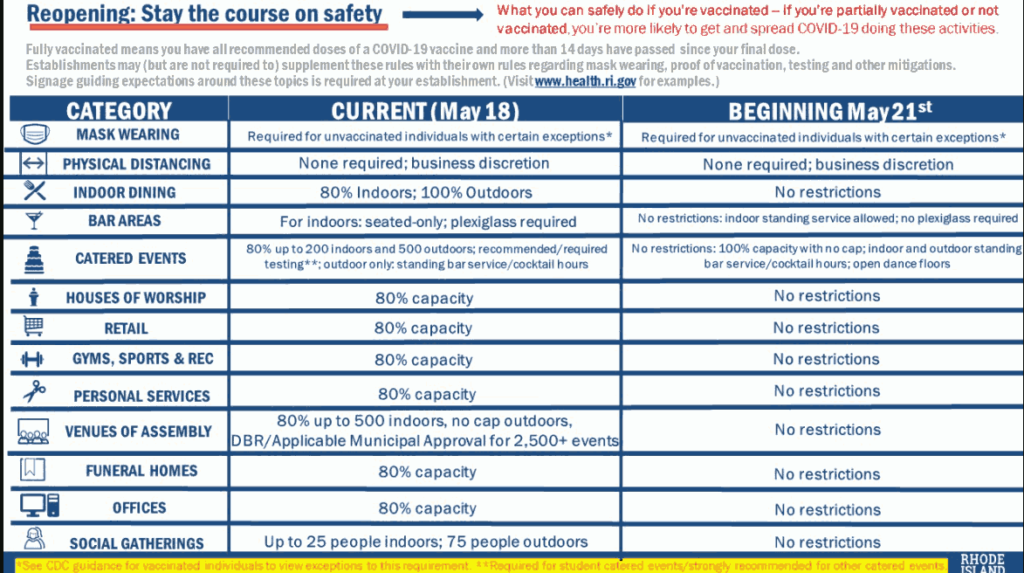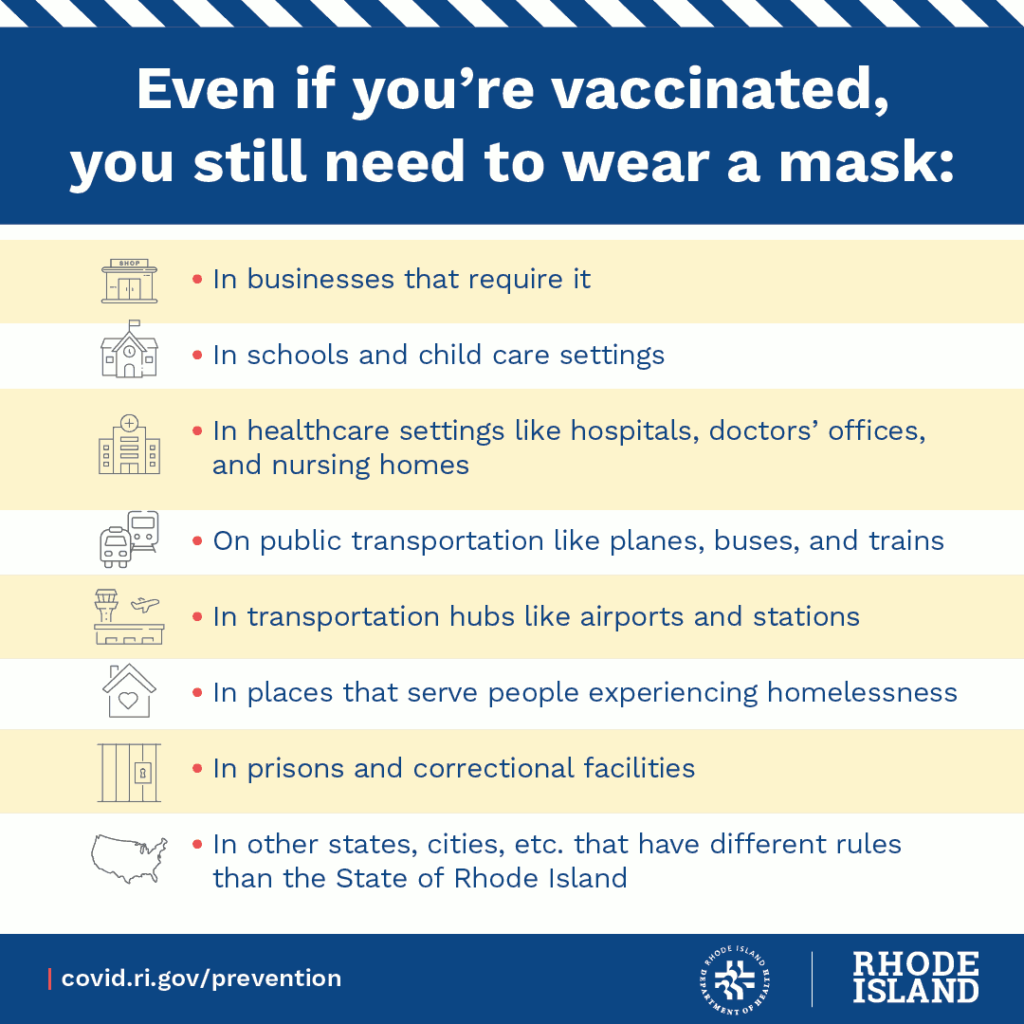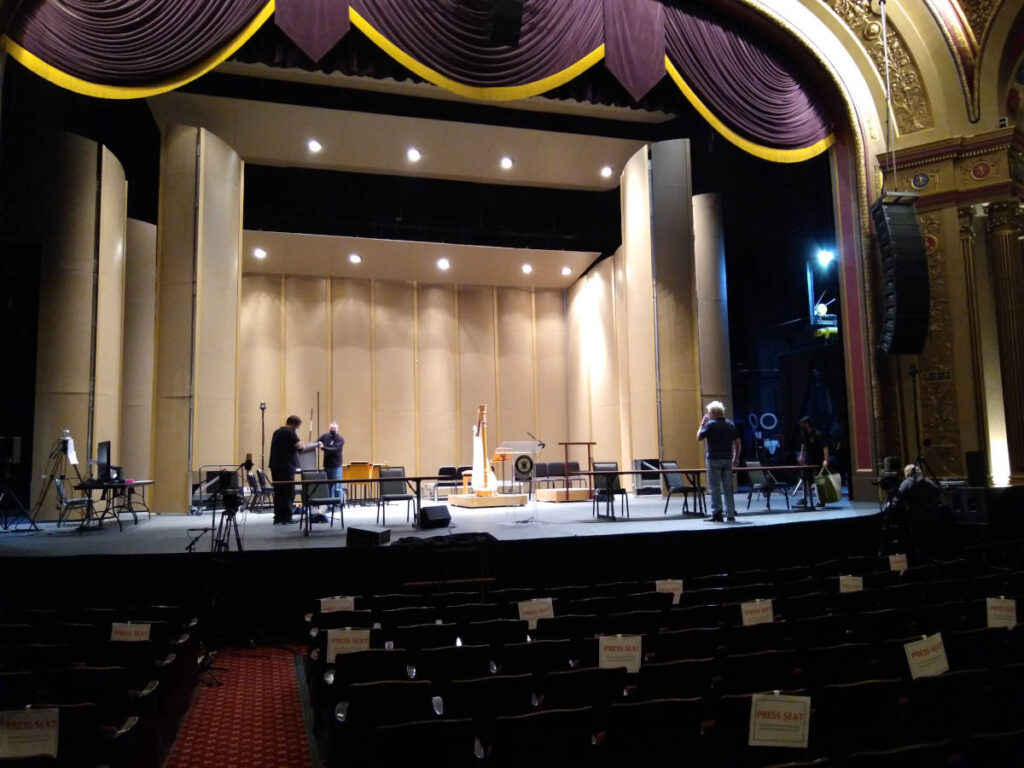Almost all COVID-19 public health restrictions in RI will end tomorrow, May 21, for people who are fully vaccinated, Gov. Daniel McKee announced at his weekly press conference today. This is a week earlier than had been previously announced for the Memorial Day long weekend, May 29-31.
RI Department of Health Director Nicole Alexander-Scott explained that “Fully vaccinated means that you have received all of the doses of the vaccine that’s required for you to be protected, and at least two weeks have followed since your last dose. That ensures the full protection that’s in place.”

For individuals who are fully vaccinated and establishments that restrict access to those fully vaccinated, the governor said that, effective tomorrow, there would be no requirements for physical distancing and no restrictions on capacity for indoor dining, bar areas (including standing service with no barriers or dividers required), catered events (including indoor and outdoor bar service), dance floors, houses of worship, retail, adult recreation (including gyms and sports), personal services, venues of assembly, funeral homes, offices, social gatherings, pools and casinos.
For individuals who are not fully vaccinated and establishments that allow access to those not fully vaccinated, previous guidelines, including mask wearing and physical distancing, will continue to apply.
In response to a question, RI Commerce Secretary Stefan Pryor said, “We’re not requiring vaccine passports, no specific format for proof of vaccinations… There are multiple ways that someone can show that they are vaccinated including the original vaccine card, including a digital image of the card, including one of these records that you get off of the website. An establishment could decide that they’re just asking individuals for the vaccine status. So these are options up to the local establishment, and we’re not requiring a passport the way other states may be, and establishments might decide they want a specific format.” However, Pryor said, if people are simply being asked by establishments whether they are vaccinated, “if they were choosing that method, I’d recommend that they call the Health Department or Commerce and talk through their strategy.”
Businesses and other establishments, although no longer required to enforce mask wearing and physical distancing if they restrict access to those fully vaccinated, may choose to continue to do so. McKee said, “Fully reopening gives businesses and organizations, individually, the option to loosen their restrictions right away. Some may take a bit more time, and, as I said on Tuesday, let’s have courtesy and understand that just as it was getting used to wearing the masks over the last year, and certainly what people were more comfortable sooner than others, it’s going to be the same thing in reverse. It doesn’t matter whether we did it today, three weeks from now, four weeks from now, there’s going to be, it’s going to be a transition. Let’s respect people during that transition. But also it’s another message to people who are not vaccinated. We want you to wear a mask inside. And we want you to seek out the ability to get vaccinated. That, again, is what is allowing us to reopen our economy and it also will allow us to reopen our schools.”
Through the end of the school year, mask wearing and similar restrictions will continue for youth sports, both indoor and outdoor, consistent with Centers for Disease Control and Prevention (CDC) recommendations to protect children who cannot yet be vaccinated. This policy will be re-evaluated after June 30.

Restrictions will continue in certain settings: in businesses that choose to require them, in schools and child care settings, in healthcare settings (including hospitals, doctor’s offices, and nursing homes), on public transport (including buses, trains, and airplanes), in transport hubs (bus stations, train stations, airports), in prisons and correctional facilities, in places that serve people experiencing homelessness, and outside RI where required by local rules. The general principle appeared to be to protect vulnerable people who either cannot or may not be vaccinated.
Alexander-Scott said that reopening the economy was safe given the conditions of the community. “A key for us in Rhode Island is to first take into account what’s happening with our data. Our percent positivity has remained below 2% for 10 days – and remember, the lower the better. Our percent positivity that we’re reporting today, as of yesterday, is 0.7%. When is the last time that you recall Rhode Island as a state having a percent positivity less than 1.0%? That is tremendous.” Recent studies showed the vaccines to be extremely effective in the real world, she said. “A way that I have thought about it is the vaccines are proving to be so effective, that even if you are in a crowded area indoors amongst people who are unvaccinated or positive once you are fully vaccinated, you can rest assured that you have the protection needed to keep you and your loved ones safe. That’s a game changer.” RI is seeing vaccine effectiveness comparable to the rest of the country, she said. “What we’ve seen, even here in Rhode Island, is that the breakthrough cases – people who have been fully vaccinated and ended up getting infected – is so extremely low, it is less than 1%; it’s actually 0.15%. So that means 99.9% of the time almost the vaccine works tremendously effectively; that far surpasses what we saw with the clinical trials.”
Alexander-Scott said the vaccines are proving effective against evolving mutated variants of the virus, warning that people who were previously infected and recovered likely have little or no natural immunity to the newer variants, so it is important for them to be vaccinated. “You cannot rely on natural immunity to be protected. If you’ve been infected in the past, you likely did not have a variant form. You had one of the older forms of coronavirus. Very quickly over the last few weeks, the predominant form [circulating in the wild] are our variants. So do not just rely on natural immunity or herd immunity to be protected. You as an individual and your loved ones have to be fully vaccinated in order to have the protection.”
RI COVID-19 czar Tom McCarthy said that 74,000 doses were administered last week. Vaccination in RI is “accessible, easy and fast,” taking about 25 minutes. “People may want to carry their documentation for proof of vaccination on them. The best proof that you have is the vaccination card that you receive. When you receive that final dose. Make a copy of it, take a picture of it on your phone, keep it in a safe place, get it laminated. If you’ve misplaced your card, and you want proof of your vaccination status, right now you can go to portal.ri.gov/VaccineRecord/s/ and on that site, you can look up your record and you can print it. If you run into any issues, you can always call 401-222-8022. We’re putting the finishing touches on a system that will allow people to call in and we can then mail you a paper copy of your vaccine records,” McCarthy said.
Although Matt Weldon, director of the Department of Labor and Training, was present on the stage, he said nothing and was not asked any questions during the press conference. Responding to a question about the difficulty businesses have reported hiring workers, McKee said, “We’ve mentioned here that it’s time for people to get back to work. We’ve set a date of May 23 where they’re going to have to show, people who are on unemployment, they’re going to need to show that they are looking for work. And I’ll sign a bill tomorrow, I think that Matt Weldon could kind of go into detail on that if you’d like it now or later, but we are working on, we’re the only state in the country right now, that has passed legislation that is going to provide a path for the people can continue to collect the [federal unemployment] $300 bonus and go back to work.”

This was the final press conference held at the Veterans Memorial Auditorium, chosen to allow physical distancing between reporters present. Starting May 11, 2020, and now ending May 20, 2021, the “Vets” was one of the few facilities that could have accommodated the unusual need, and the governor thanked the staff of the facility for welcoming them. Future press conferences will be at the State House, which the governor said he expected to begin gradually reopening to the public.

